Jeff's story:
Why this dad was drained from a 2-week paternity leave and energized from a 12-week leave
Jeff had a dynamic role in content partnerships and media distribution when he was expecting his first son. He looked forward to the two-week paternity leave offered to him at the time; that was standard, right? His friends did okay with two-week leaves, so naturally, Jeff assumed it would be sufficient time to help his family find their new groove.
But once his son was born, he experienced the intensity of newborn life. The sleep deprivation, physical demands, and emotional toll were difficult to handle, let alone helping his wife recover and partner in childcare.
With only two weeks of leave, Jeff wasn’t able to fully step away from work. His role on key projects and team engagements kept moving during his small chunk of out-of-office time. He found himself trying to learn diaper changes and night feedings, all while answering work emails.
Once he went “back” to work, he struggled with the trade-offs in the first few months. If he took the night shift with the baby so his wife could get some rest, he was exhausted and didn’t have the energy to be present at work fully. And if he worked a full, demanding day and prioritized his own sleep, he felt guilty for not supporting his family.
Eventually, Jeff was able to find a rhythm as a working parent. But as he considered future career moves and a growing family, he was critical of employers’ parental benefits. It seems to tell a lot about how the company treats parents and their overall attitude towards work-life balance.
Five years later, Jeff’s second son was on the way. He was now working at Google, which offered 12 weeks of paid leave. Being new at the organization, he asked others about their experiences with some trepidation: did dads actually take the full leave? Was it accepted and normalized? Given his revenue targets, would his team be able to achieve its goals in his absence?
To his delight, he found out that Google consistently supported and encouraged the full, three-month leave for fathers. Employees could split up the leave over time. Still, given his family situation and the unknowns surrounding the COVID-19 pandemic, Jeff opted to take the full 12 weeks immediately following the birth of his second son.
Jeff’s experience could not have been more different (aka refreshing) than his first leave. Jeff was able to bond with his new baby and spend extra time with his oldest son. He could support his wife’s healing and take the overnight shift regularly. He was able to clear his head with time away from the demands of his job.
But the most dramatic impact of the 12 weeks was how much his extensive paternity leave increased his gratitude and energy for his career.
“My 12-week leave made me want to come back and put my best foot forward. My employer took care of me, so I want to take care of my employer.”
Beyond just the time away, his careful planning combined with a supportive manager enabled him to have a successful ramp-down and ramp-up experience.
Keep reading to see how more inclusive parental leave policies for all parents mutually benefit the employee and the business. Dive deeper below.


#1 Why two weeks of parental leave just isn't enough
When Jeff had his first child, he had been at his company for four years and received two weeks of paternity leave. “Leave [for fathers] was about two weeks, which to be honest was on the high end of leave for dads at that point in time, which sounds crazy now.”
Here’s why Jeff feels two weeks is just not enough time for any parent to take for parental leave:
- There wasn’t enough time to unplug and actually focus on the baby: “I never had a chance to fully unplug from work and be completely present with my family. Because the break was so brief, I felt compelled to stay on top of work emails and ensure I wouldn’t be behind when I returned to the office.”
- He felt pressure to accelerate certain timelines to fit his leave: “I felt the urgency to cram all of these errands that come with a newborn into my two weeks, which ultimately added to the stress of the period.”
- He wasn’t able to appropriately support his wife: Two weeks wasn’t enough time for his wife to recover from childbirth, so he felt that returning to work so soon was doing a disservice not only to his son but also to his wife who now had to recover and take care of the baby.
- He was exhausted going back to work so soon: “I was surprised by how exhausted I was and how impossible it felt to wake up multiple times overnight and then bring your whole self to work and be super attentive.” Just because a new father is back working doesn’t mean they are productive and fully present, as they are still trying to support their partner and new baby at home at the same time.
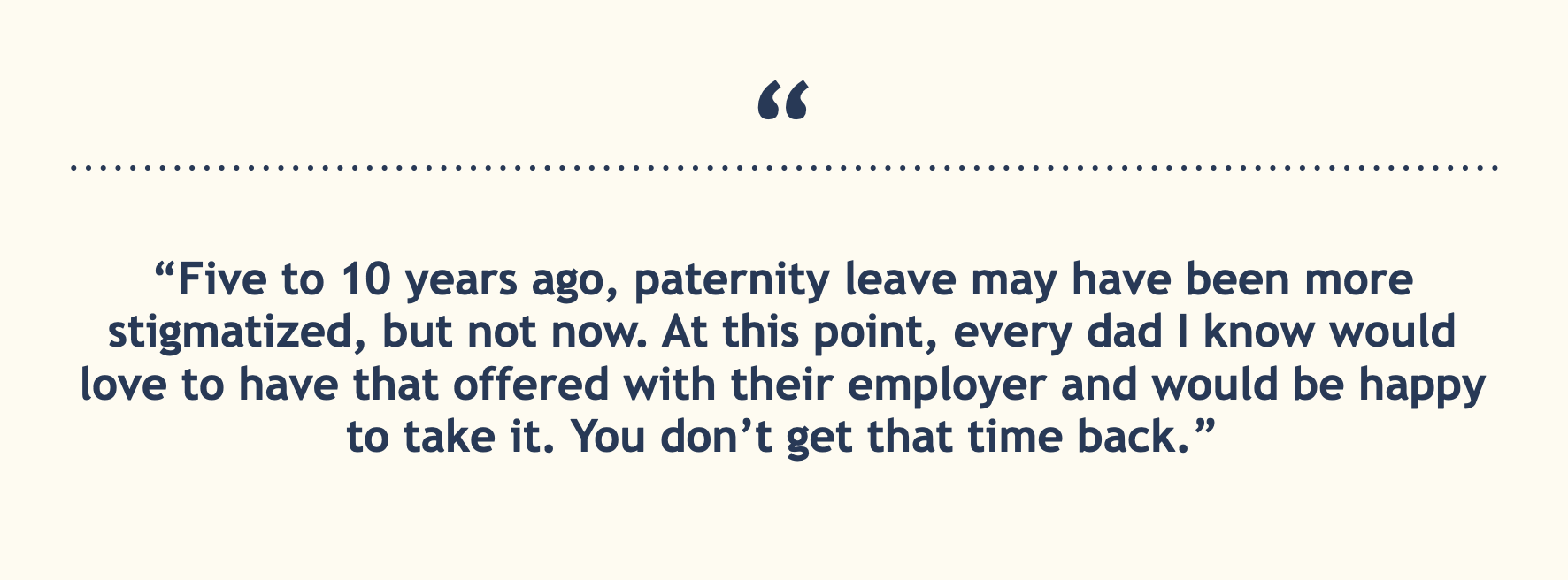
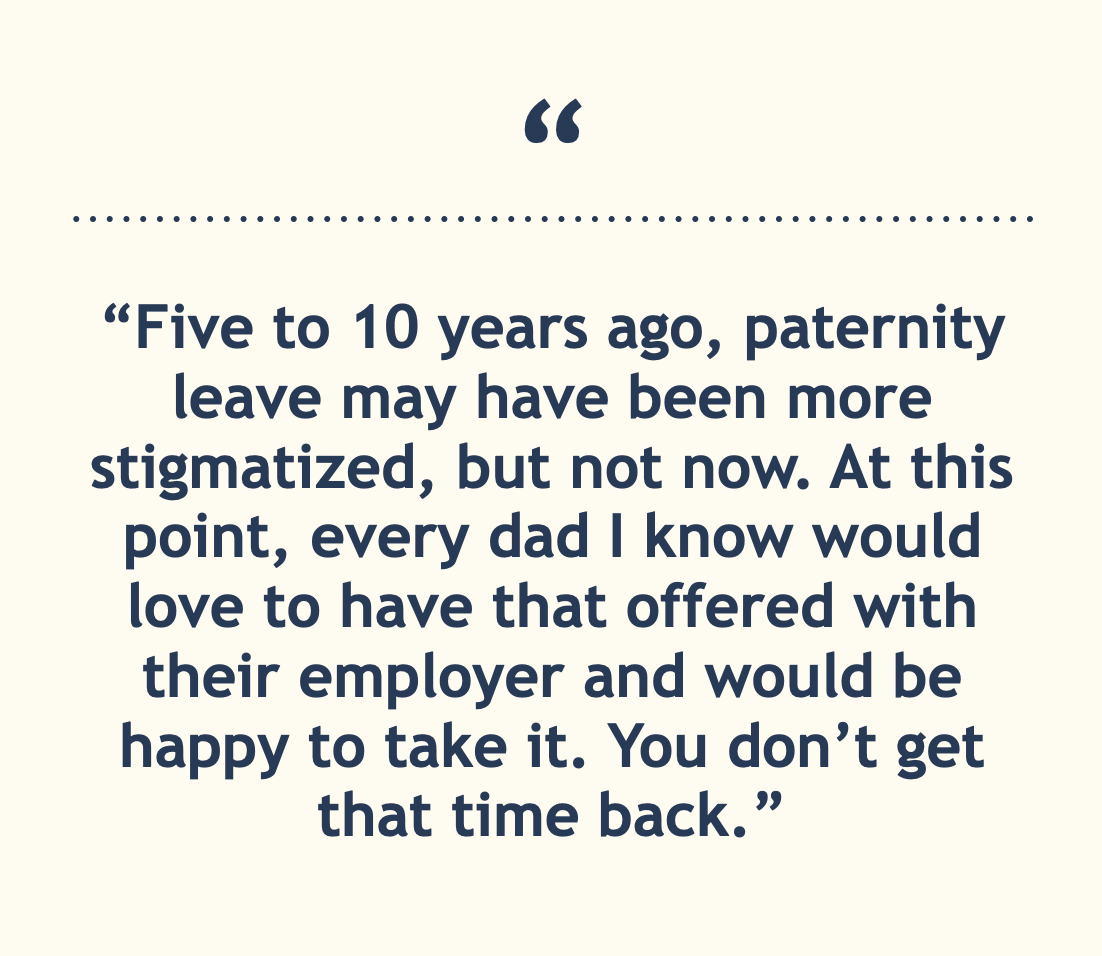
#2 Why taking 12 weeks of paternity leave with his second child was such a phenomenal experience
By the time Jeff had his second child, he had switched employers and was working for Google, where he enjoyed 12 weeks of fully paid parental leave.
This leave experience left a strong and lasting impression on Jeff and his family. It meant he could offer a different level of support to his wife and family as they welcomed a new baby.
“Honestly, part of what was nice about the extended time off was knowing I could help my wife at night. Early on, we would trade off sleeping with the baby, and I only could do that and help because I knew I wasn’t going to work. That wouldn’t even be a consideration if I had a shorter leave.”
Now almost a year after returning to work, Jeff is still reflecting on the benefits of taking leave, which include:
- Improved team dynamics: The act of stepping away from work for three months allowed Jeff’s team to experiment with working more independently without him. When Jeff returned to work he embraced this independence and began to rethink key team dynamics. “My approach when I came back was: ‘How can I help push things forward’, not: ‘Here’s what we are going to do.’”
- Greater appreciation for his work: “Having that time off gave me greater appreciation for why I work. Without a pause it is so easy to get lost in the minutiae of the day-to-day, but the time away allowed me to refocus on the bigger picture. It is so helpful to be able to take a step back to reprioritize.”
- Improved efficiency translates into better quality work: Having space and time away from work allowed Jeff to return to work with greater intentionality. He has implemented new tools and approaches to increase his productivity and efficiency at work, ensuring he is strategically adding value. “I am a lot more deliberate about getting work done within set periods of time. Maybe there is a deck I need to work on: I block off an hour or two to finish it. And maybe I could improve it 10% more if I spent another hour, but I’m now far more judicious about evaluating the marginal benefit of that additional work if it comes at the expense of missing time with my family.”
- Strong loyalty to Google: “I truly felt like I had the liberty to temporarily forget about work and fully focus on my family. When I returned to the office 12 weeks later I had a very deep sense of gratitude for my employer and their willingness to offer that benefit. Now a year later, I still feel incredibly grateful for that time.”

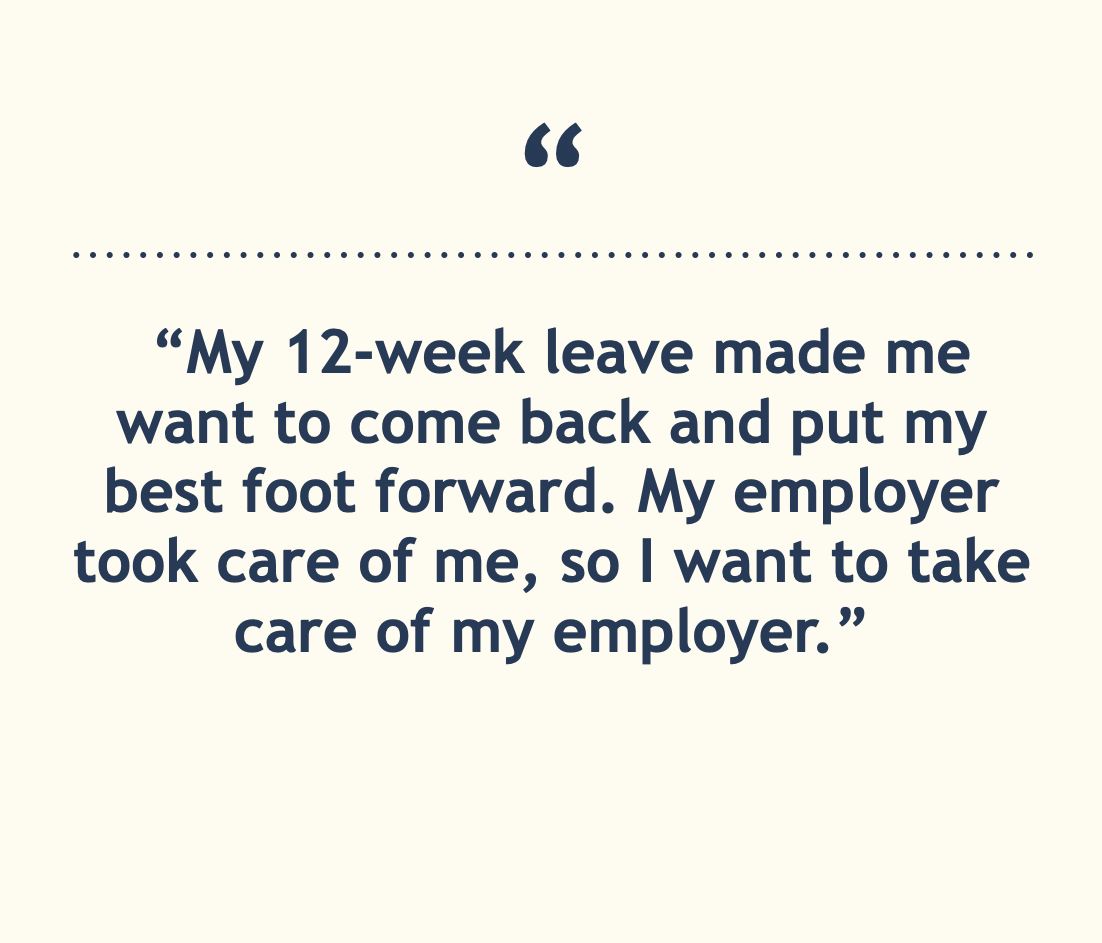
#3 Longer paternity leave does require careful preparation in advance of leave and a thoughtful ramp-up upon return to work
Jeff works within ad technology sales, partnering with some of the largest media companies in the world for advertising solutions. He leads a team of account managers, and together his team is held accountable to specific revenue results and growth. Planning for 12-week paternity leave in the context of managing toward specific KPIs required careful consideration.
Here is how Jeff did it:
- Began his coverage plan six weeks before the due date and iterated on it each week after that: Jeff put together a coverage plan with his manager. He updated it once or twice a week leading up to his wife’s due date to be accurate whenever he had to leave. He strategically made the document sharable within his team, so everyone could have access to the ongoing status of projects and conversations.
- Started CCing people into emails: As he got within a few weeks, he tried to CC other people into almost all of his emails so that they would be in the loop and able to move things forward in his absence. “I had to be sure to ramp up my team so that when I went out nothing was a cold handoff. That was a good business practice but was also selfish. I didn’t want people to have to reach out to me for unnecessary questions during my leave when I’m not sleeping and focused on my family.”
- Established a clear expectation that he would not work while on leave, unless there was a true emergency: The support of Jeff’s manager was critical in making his leave a success. She was direct and upfront in clarifying that they would not reach out to him unless it was an emergency.
- Asked to be informed of any major updates before he returned to work: Jeff ended up having just one conversation with his manager late into his leave on a team shift she wanted to make him aware of. “It didn’t require any action on my part, but I really appreciated being informed instead of surprised when I returned to work. That was one of the greatest gifts the organization could give me - the ability to truly unplug and not focus on how the business is doing day-to-day. There’s no substitute for that.”
- Received a summary report from his manager when he returned: One of the most valuable things his manager did to support him was to capture key organizational, client, and team changes made during his leave. She captured key notes with links to communications in a single document during his leave, and gave it to him on his first day back. “It was incredibly valuable. My alternative was to go back to my inbox for three months and dig through it, and this saved me so much time.”
- Created an intentional and thoughtful ramp back plan: Jeff and his manager were deliberate and thoughtful in how they ramped him back up. His employer did offer an option to initially come back part-time, but he chose to return full-time because he was energized to get back to the team and his work. Still, it took a good 4-6 weeks for him to be fully up to speed. He needed that time for 1:1s and to do prioritization and planning work in the context of the current work and goals.
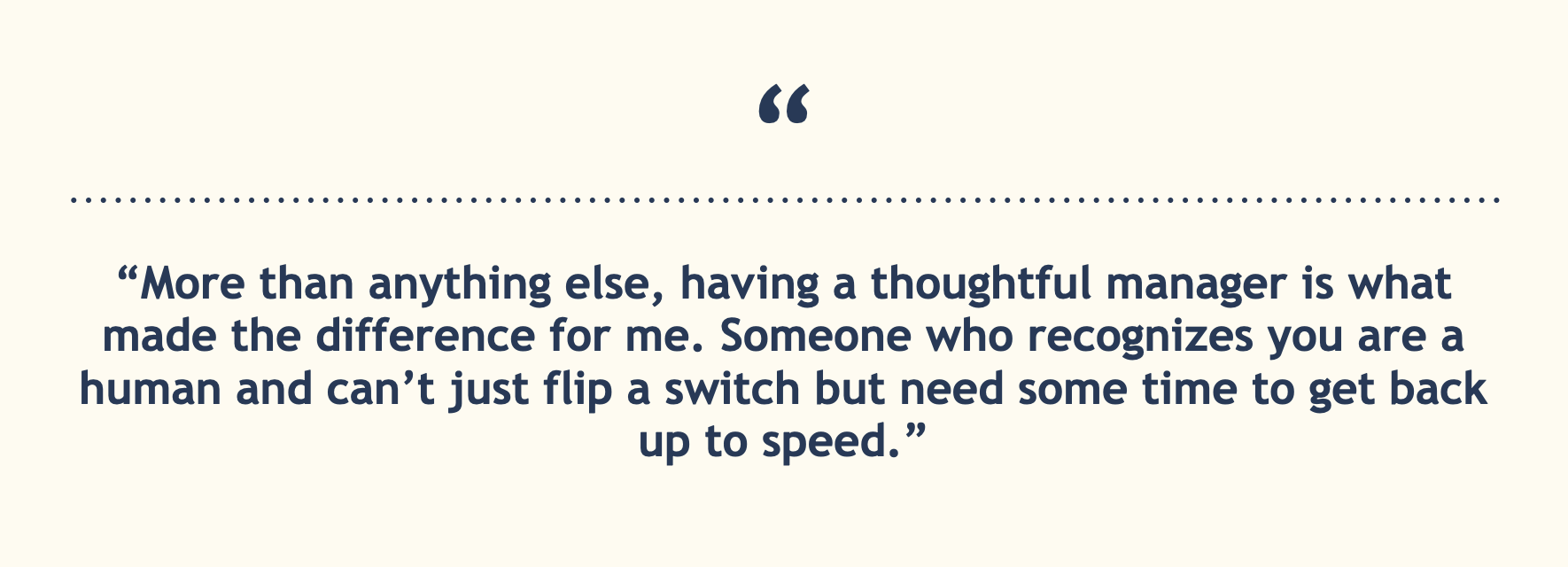
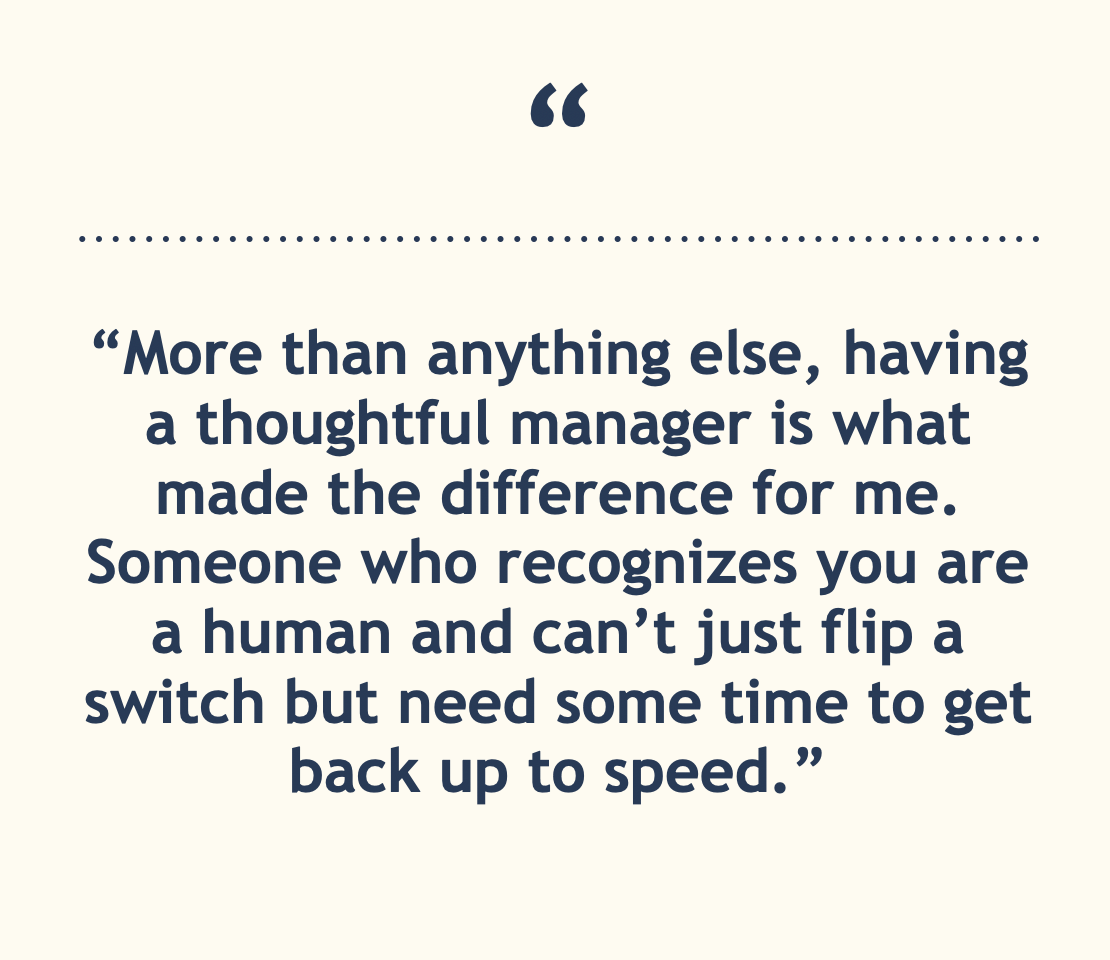
Want to read more of these stories?
We'll send them straight to your inbox every time we publish a new profile (two times per month).
Send them to me!

